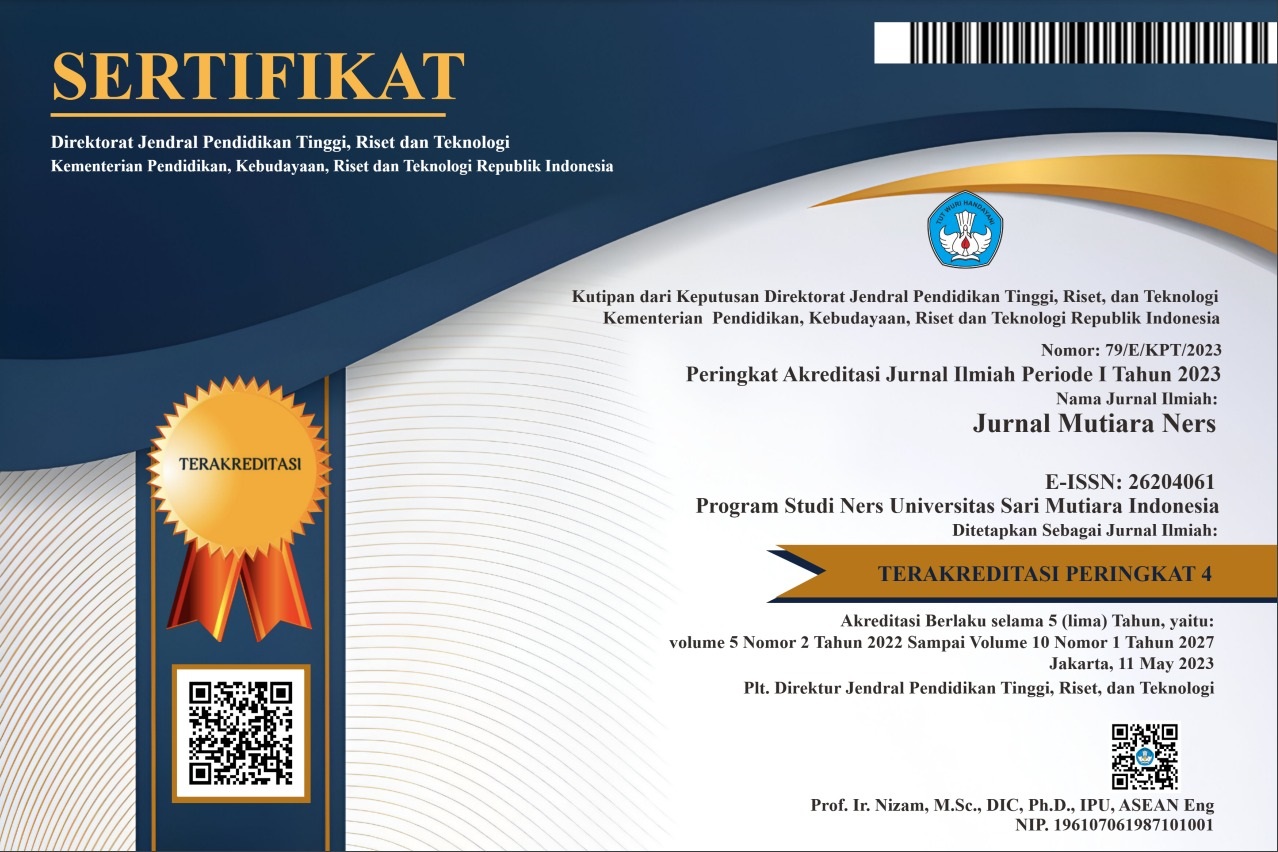PENGARUH DIABETES SELF MANAGEMENT EDUCATION (DSME) BERBASIS APLIKASI WHATSAPP TERHADAP SELF EFFICACY PADA PASIEN DM TIPE 2 DI PUSKESMAS HAMPARAN PERAK
Keywords:
Diabetes Mellitus, DSME, Whatsapp, Self EfficacyAbstract
Diabetes mellitus (DM) is one of the biggest health problems in the world because every year there is an increase in cases. In addition to the increasing number, DM is also known to cause many complications which are divided into two, namely acute complications and chronic complications. The emergence of complications and leading to death in DM patients is due to the low self-efficacy and self-care behavior of DM patients themselves. Self-efficacy is an important factor that is defined as a patient's confidence in maintaining and improving his medical condition. Seeing the importance of self-efficacy in the care of DM patients, increasing patient self-efficacy is needed, namely through the Diabetes Self Management Education (DSME) program. The purpose of this study was to determine the effect of the WhatsApp-based DSME application on the self-efficacy of Type 2 DM patients. This type of research is a Quasy Experiment and the sampling technique used in this study is purposive sampling (Non-Probability sampling). The research design used was Pre-Experiment With Only one Group Pretest - Postest Design. The number of samples was 22 DM type 2 patients. Demographic data collection through questionnaires distributed via google form. The statistical test used was the Paired t test. The results of statistical tests found that there was an effect of WhatsApp-based DSME on the self-efficacy of Type 2 DM patients, with a p value of 0.000 (p <0.05). This shows that there is an effect of WhatsApp-based DSME on the self-efficacy of Type 2 DM patients at the Hamparan Perak Community Health Center.
Downloads
References
Ahdiah, Nurul & Arofiati. 2019. Metode- Metode Penyampaian Diabetes Self Management Education (DSME). 10(1).
Banna, T. 2017. Self-Efficacy Dalam Pelaksanaan Manajemen Diri (Self- Management) Pada Pasien Diabetes Mellitus. 7 (2).
Damayanti, Santi. 2017. Diabetes Mellitus dan Penatalaksanaan Keperawatan. Yogyakarta: Nuha Medika.
Dolongseda, Vietryani Fehmi., M, Gresty., B, Yolanda. Hubungan Pola Aktivitas Fisik Dan Pola Makan Dengan Kadar Gula Darah Pada Pasien Diabetes Melitus Tipe Ii Di Poli Penyakit Dalam Rumah Sakit Pancaran Kasih Gmim Manado. Volume (5) Nomor (1).
Fatimah, Restyana Noor. 2015. Diabetes Melitus Tipe 2. 4(5) IDF Diabetes Atlas. Eight Edition, 2017.
Decroli, Eva. 2019. Diabetes Melitus Tipe 2. Padang: Pusat Penerbitan Bagian Ilmu Penyakit Dalam.
Dinas Kesehatan Sumatera Utara. 2018. Profil Kesehatan Provinsi Sumatera Utara Tahun 2018.
Hatmanti, Nety Nawarda. 2017. Hubungan Antara Self Efficacy Dengan Quality Of Life Pada Pasien Diabetes Mellitus Tipe 2 Di Wilayah Kerja Puskesmas Kebonsari Surabaya. 10(2).
Kurniawati, Trina., Huariah, T., Primanda,
Y. 2019. Pengaruh Diabetes Self Management Education (DSME) terhadap Self Management pada Pasien Diabetes Mellitus. Jurnal Ilmiah Kesehatan (JIK) Vol XII, No I.
Kristiyani, T. 2016. Self-Regulated Learning. Yogyakarta: Shanata Dharma University Press.
Manuntung, A. 2018. Terapi Perlaku Kognitif Pada Pasien Hipertensi. Malang : Wineka media.
Marbun, Agnes. S. 2020. Hubungan Pelaksanaan Empat Pilar Dengan Kejadian Rehospitalisasi Pada Penderita Diabetes Melitus. Jurnal Kesehatan Surya Nusantara.8(1). 20-28.
Nadziroh, Umi. 2016. Hubungan Efikasi Diri Dengan Mekanisme Koping Pada Pasien Diabetes Melitus (DM) Tipe 2 Di Poli Penyakit Dalam Rsud Dr. Haryoto Lumajang.
PERKENI, 2015. Konsensus Pencegahan dan Pengendalian Diabetes Melitus Tipe 2 di Indonesia.
Pramesthi, I.R & Purwanti, O.S. 2020. Hubungan Pengetahuan Pengelolaan Diabetes Melitus Dengan Efikasi Diri Pada Penyandang Diabetes Melitus Tipe II.
Prihatin, K., Suprayitna, M., Fatmawati
B.R. 2019. Motivasi Terhadap Efikasi Diri Dalam Perawatan Diri Pada Pasien Diabetes Mellitus Tipe 2. 7 (1).
Puspita, Dyah Wiji. 2018. Buku Panduan Pelatihan Kader Kesehatan Kelompok Pendamping Diabetes Self Management Education Berbasis Keluarga (Kp- DSME Keluarga). Semarang: UNISSULA PRESS.
Rahman, H.F., Yulia, Sukmarini, L. 2017. Efikasi Diri, Kepatuhan, dan Kualitas Hidup. 5(1).
Rahmawati, Fuji., Idriansari, A., Wuharyani, P.W. 2018. Upaya Meningkatkan Dukungan Keluarga Penderita Diabetes Mellitus Tipe 2 Dalam Menjalankan Terapi Melalui Telenursing. 5(2).


.png)





